Chewy Bundle
Who Really Owns Chewy?
The pet supply industry witnessed a seismic shift when PetSmart acquired Chewy in 2017, marking a pivotal moment in e-commerce history. This acquisition not only reshaped Chewy's strategic direction but also highlighted the critical role of ownership in shaping a company's trajectory. Understanding the Chewy SWOT Analysis is essential for investors and strategists alike.
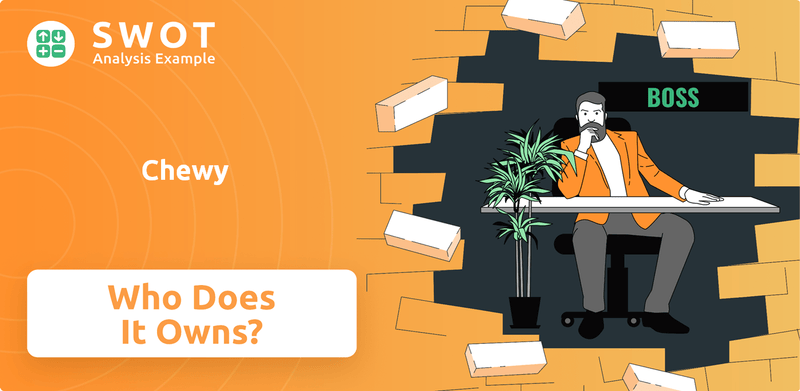
This exploration into Chewy ownership will uncover the evolution of the Chewy company, beginning with its founders and tracing the influence of key investors. We'll examine the dynamics of its public shareholders and the significant changes in its ownership profile over time. Discovering who owns Chewy now is key to understanding its current market position and future growth prospects, including details on its Chewy parent company and Chewy history.
Who Founded Chewy?
The online pet supply retailer, was founded in 2011 by Ryan Cohen and Michael Day. This marked the beginning of a significant player in the e-commerce sector, specifically targeting the pet industry. The founders' vision was to revolutionize how pet owners purchase supplies, focusing on customer experience and convenience.
Ryan Cohen, with his entrepreneurial drive, was instrumental in shaping the customer-centric approach that defined the company's early success. Michael Day contributed to the operational and technological aspects of building the online retail platform. Their combined efforts laid the groundwork for the company's rapid expansion and market penetration.
While the exact initial equity split between the founders isn't publicly detailed, it's understood that Ryan Cohen and Michael Day held the primary ownership stakes. This early ownership structure was crucial in setting the company's direction and fostering a culture of innovation and customer focus.
Early funding rounds helped the company grow. Early investors included venture capital firms like Volition Capital, which invested in 2013. These investments provided capital for expansion and infrastructure. The company's success is also reflected in its market share and financial performance, as highlighted in a comparative analysis of its Competitors Landscape of Chewy.
- Early agreements likely included standard venture capital terms.
- These terms involved preferred stock structures and vesting schedules.
- There were no significant initial ownership disputes.
- The founders' vision focused on customer service.
Chewy SWOT Analysis
- Complete SWOT Breakdown
- Fully Customizable
- Editable in Excel & Word
- Professional Formatting
- Investor-Ready Format
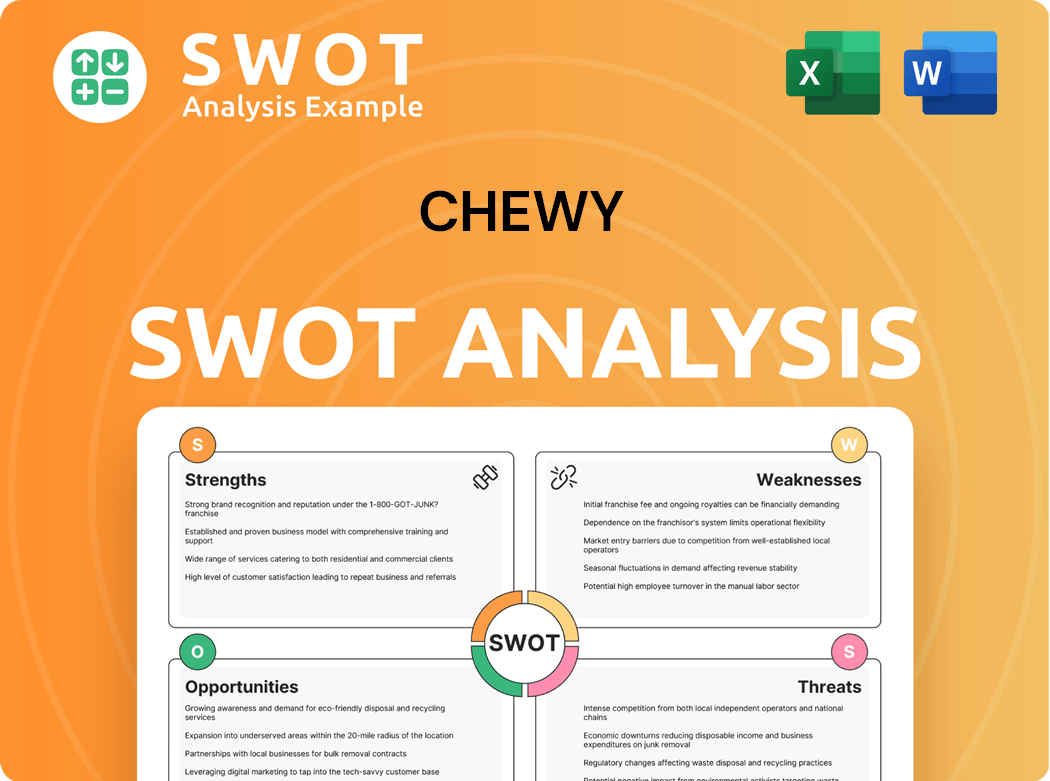
How Has Chewy’s Ownership Changed Over Time?
The journey of Chewy's ownership began with its acquisition by PetSmart in May 2017 for approximately $3.35 billion. This move transformed Chewy from a venture capital-backed private entity into a subsidiary of PetSmart, which was then owned by BC Partners. Ryan Cohen, the co-founder, continued to lead the company after the acquisition. This was a pivotal moment in Chewy's history, marking a significant change in its ownership structure.
A key development in Chewy's ownership occurred in June 2019 when PetSmart initiated an Initial Public Offering (IPO). Chewy began trading on the New York Stock Exchange under the ticker symbol 'CHWY.' The IPO saw the sale of 59.7 million shares at $22.00 each, raising around $1.3 billion. At the time of the IPO, PetSmart remained the majority shareholder, holding about 70% of Chewy's outstanding shares. This strategic move allowed PetSmart to decrease its debt while giving Chewy access to public capital for further expansion.
| Milestone | Date | Details |
|---|---|---|
| Acquisition by PetSmart | May 2017 | Acquired for approximately $3.35 billion, making Chewy a subsidiary of PetSmart. |
| IPO | June 2019 | Chewy went public on the NYSE (CHWY), raising approximately $1.3 billion. |
| Current Ownership | Early 2024 | Institutional investors, mutual funds, and index funds hold the majority of shares, with PetSmart's stake significantly reduced. |
Post-IPO, Chewy's major stakeholders are primarily institutional investors, mutual funds, and index funds, along with PetSmart (though its stake has decreased). As of March 31, 2024, The Vanguard Group Inc. held 33,356,864 shares, representing 7.82% of the company, valued at $648,391,000. BlackRock Inc. held 32,836,252 shares, or 7.70%, valued at $638,367,000. Other major institutional investors include Capital Research Global Investors, Morgan Stanley, and FMR LLC. This shift towards dispersed ownership has given Chewy greater independence in strategic decision-making and access to capital, while still being influenced by its large institutional investor base. Learn more about the company's journey and its impact on the market by reading more about 0.
Chewy's ownership has evolved significantly since its acquisition by PetSmart.
- From private equity to public markets.
- PetSmart's role has diminished over time.
- Institutional investors now hold a significant portion of shares.
- Chewy's strategic decisions are influenced by a diverse investor base.
Chewy PESTLE Analysis
- Covers All 6 PESTLE Categories
- No Research Needed – Save Hours of Work
- Built by Experts, Trusted by Consultants
- Instant Download, Ready to Use
- 100% Editable, Fully Customizable
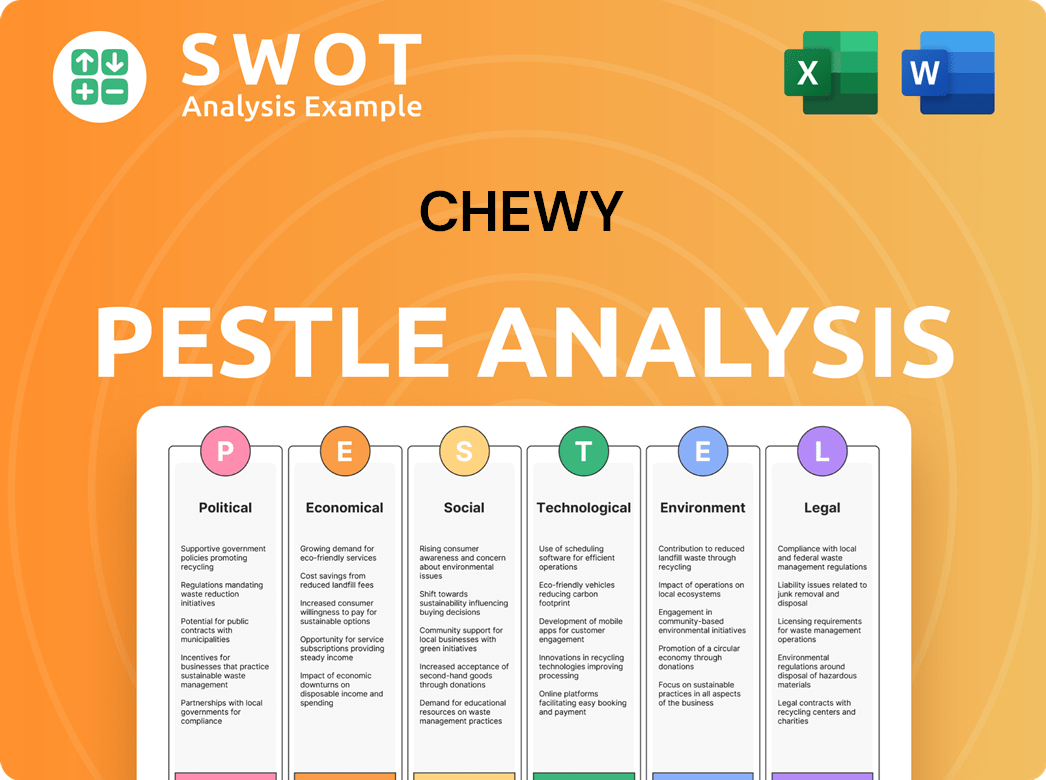
Who Sits on Chewy’s Board?
The current Board of Directors at Chewy, Inc. is key to the company's governance and strategic direction. As of early 2025, the board includes individuals representing various interests, such as those linked to major shareholders, independent directors, and company executives. While specific details on board members directly representing major shareholders like BC Partners (through PetSmart's influence) or large institutional investors aren't always public, it's typical for large institutional investors to influence through significant shareholdings and engagement with management. Sumit Singh, the Chief Executive Officer, is also a board member. Other board members generally have experience in e-commerce, retail, finance, and technology, bringing diverse expertise to the company's strategy. For instance, as of April 2024, the board included individuals like James A. Star, who serves as Chairman, and independent directors such as Sharon L. McCollam and Matthew J. McEvoy.
The board's composition and the one-share-one-vote structure generally ensure that decision-making aligns with the interests of the broader shareholder base. Chewy operates primarily under a one-share-one-vote voting structure, which is standard for most publicly traded companies. This means each share of common stock usually gives its holder one vote on shareholder matters, like electing directors or approving corporate actions. There are no publicly disclosed special voting rights or founder shares that give outsized control to specific individuals or entities beyond their proportional equity ownership. This structure helps maintain a balance of power among shareholders. To learn more about the company's beginnings, check out the Brief History of Chewy.
| Board Member | Title | Affiliation |
|---|---|---|
| Sumit Singh | Chief Executive Officer | Chewy, Inc. |
| James A. Star | Chairman | Independent |
| Sharon L. McCollam | Director | Independent |
| Matthew J. McEvoy | Director | Independent |
Chewy operates with a one-share-one-vote system, ensuring each share has equal voting power. This approach is common among publicly traded companies. The board includes a mix of executives, independent directors, and representatives from major shareholders.
- One-share-one-vote voting structure
- Diverse board composition
- Focus on shareholder alignment
- Stable governance with no recent controversies
Chewy Business Model Canvas
- Complete 9-Block Business Model Canvas
- Effortlessly Communicate Your Business Strategy
- Investor-Ready BMC Format
- 100% Editable and Customizable
- Clear and Structured Layout
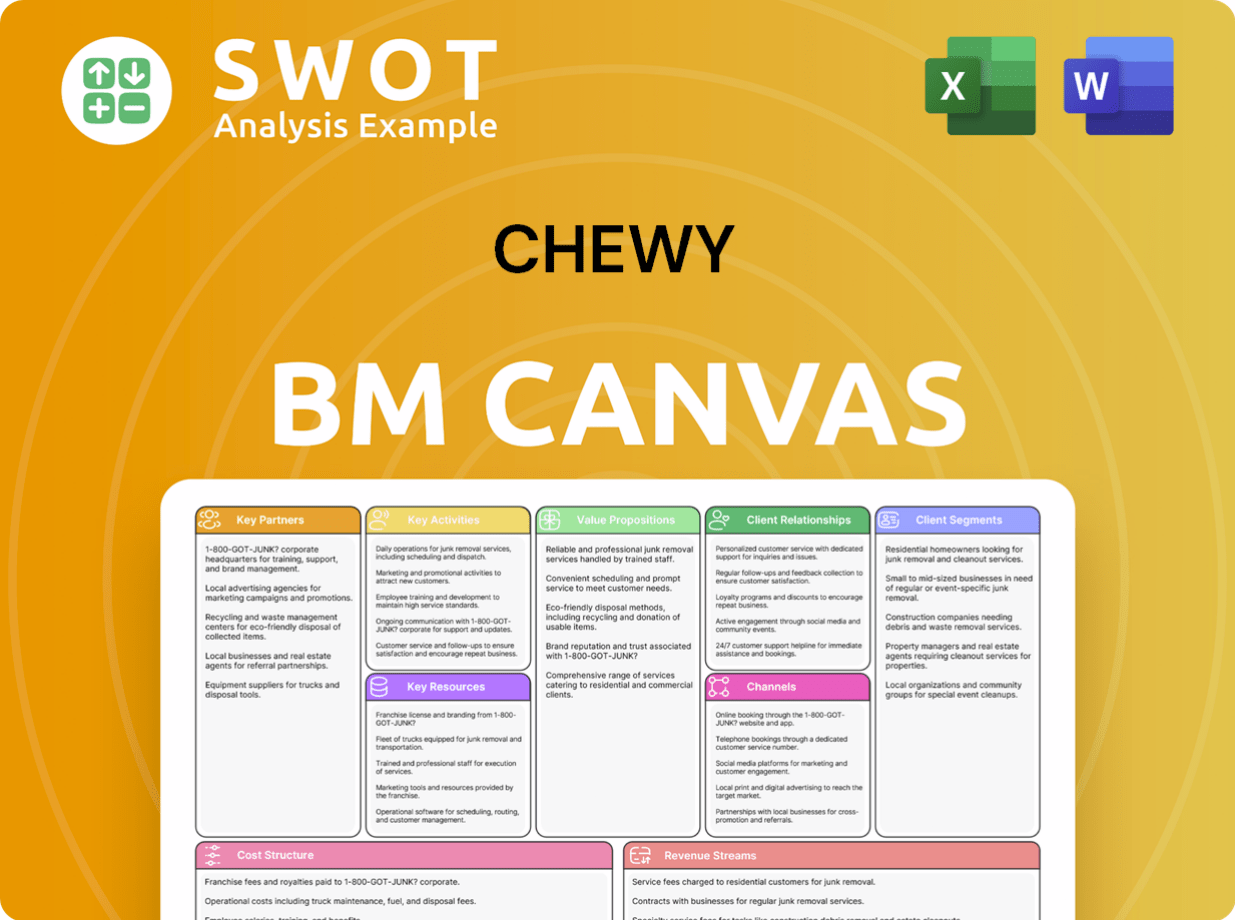
What Recent Changes Have Shaped Chewy’s Ownership Landscape?
In the past few years, the ownership of the Chewy company has evolved significantly. A key trend has been the gradual reduction of PetSmart's stake in Chewy. PetSmart, under the ownership of BC Partners, has been selling its shares through secondary offerings. For example, in March 2021, they sold 5.2 million shares. This selling trend is expected to continue as BC Partners aims to realize returns on its investment.
Industry trends, such as increased institutional ownership, are evident in the Chewy company's case. As of early 2025, institutional investors hold a substantial majority of the outstanding shares. This indicates confidence from professional money managers. While the founders, Ryan Cohen and Michael Day, no longer hold significant controlling stakes, their initial vision continues to influence the company. Founder dilution is a natural consequence of multiple funding rounds and a public offering.
| Ownership Trend | Details | Impact |
|---|---|---|
| PetSmart Divestiture | Ongoing sales of shares by PetSmart (BC Partners). | Reduced PetSmart's stake, increased public float. |
| Institutional Ownership | Significant holdings by institutional investors. | Indicates confidence in the company's long-term prospects. |
| Founder Dilution | Founders no longer hold controlling stakes. | Reflects the company's growth and public status. |
Beyond PetSmart's divestment and institutional accumulation, there haven't been major changes altering the ownership structure. Leadership changes can subtly shift internal ownership dynamics, but the core public ownership remains dominated by institutional holders. Analysts view Chewy as a strong independent public company within the growing pet e-commerce sector. For more insights into Chewy's strategic growth, you can explore the Growth Strategy of Chewy.
The primary owner of Chewy is a mix of institutional investors. PetSmart, the former parent company, is gradually reducing its stake. The founders, Ryan Cohen and Michael Day, are no longer the primary owners.
The stock ownership of Chewy is primarily held by institutional investors. PetSmart, having been the initial parent company, has been selling its shares. The stock is publicly traded, with no single controlling shareholder.
Yes, Chewy is a publicly traded company. It went public in 2019. The stock is available for purchase on major stock exchanges. Institutional investors hold a significant portion of the shares.
PetSmart acquired Chewy in 2017. BC Partners, the owner of PetSmart, later began selling off shares. The company has since become independent. Chewy's headquarters are located in Dania Beach, Florida.
Chewy Porter's Five Forces Analysis
- Covers All 5 Competitive Forces in Detail
- Structured for Consultants, Students, and Founders
- 100% Editable in Microsoft Word & Excel
- Instant Digital Download – Use Immediately
- Compatible with Mac & PC – Fully Unlocked
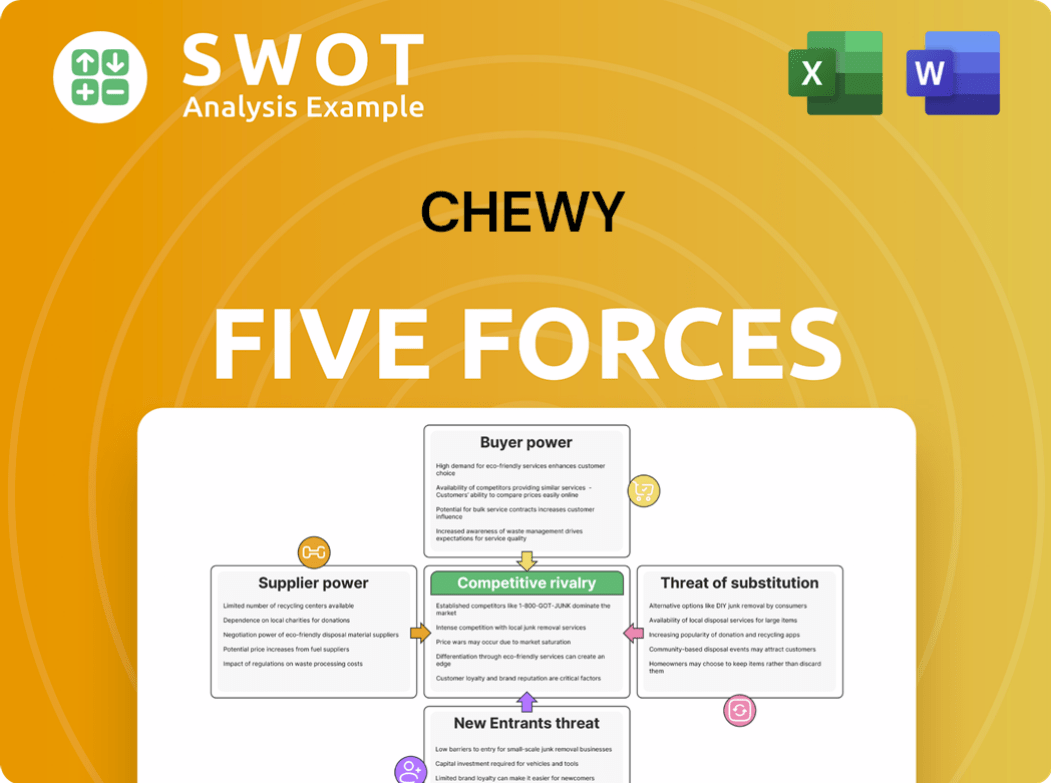
Related Blogs
- What are Mission Vision & Core Values of Chewy Company?
- What is Competitive Landscape of Chewy Company?
- What is Growth Strategy and Future Prospects of Chewy Company?
- How Does Chewy Company Work?
- What is Sales and Marketing Strategy of Chewy Company?
- What is Brief History of Chewy Company?
- What is Customer Demographics and Target Market of Chewy Company?
Disclaimer
All information, articles, and product details provided on this website are for general informational and educational purposes only. We do not claim any ownership over, nor do we intend to infringe upon, any trademarks, copyrights, logos, brand names, or other intellectual property mentioned or depicted on this site. Such intellectual property remains the property of its respective owners, and any references here are made solely for identification or informational purposes, without implying any affiliation, endorsement, or partnership.
We make no representations or warranties, express or implied, regarding the accuracy, completeness, or suitability of any content or products presented. Nothing on this website should be construed as legal, tax, investment, financial, medical, or other professional advice. In addition, no part of this site—including articles or product references—constitutes a solicitation, recommendation, endorsement, advertisement, or offer to buy or sell any securities, franchises, or other financial instruments, particularly in jurisdictions where such activity would be unlawful.
All content is of a general nature and may not address the specific circumstances of any individual or entity. It is not a substitute for professional advice or services. Any actions you take based on the information provided here are strictly at your own risk. You accept full responsibility for any decisions or outcomes arising from your use of this website and agree to release us from any liability in connection with your use of, or reliance upon, the content or products found herein.